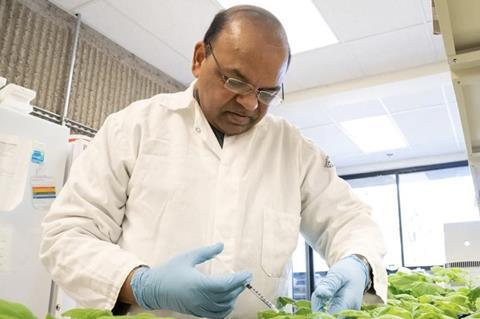Chemical ebselen found to help prevent fungal infections in a range of crops

Plant biologists at University of California, Davis have identified a promising new fungicide to fight devastating crop diseases. They found that the chemical, ebselen, prevented fungal infections in apples, grapes, strawberries, tomatoes and roses, and improved symptoms of pre-existing fungal infection in rice.
Fungal pathogens account for almost a quarter of global crop losses—in the US, these losses amount to around US$150bn each year. However, fungicide development has been slow for the past 50 years, largely because researchers have had difficulty identifying molecular pathways to target.
In a new study published in February in Nature Communications, UC Davis researchers identified fungicide candidates that target autophagy, a cellular recycling process that was recently shown to be essential for fungal pathogenicity.
Using a novel screening method based on bioluminescence, the researchers identified 30 chemicals that inhibit a key enzymatic step in fungal autophagy. The most promising candidate, a chemical called ebselen that has been shown to have anti-inflammatory and neuroprotective properties in humans, was more effective at preventing in vitro fungal growth than currently available fungicides.
“Inhibiting autophagy significantly reduces the pathogenicity of several devastating fungal pathogens,” said senior author Savithramma Dinesh-Kumar, a professor and chair in the Department of Plant Biology. “Our findings provide molecular insights that will help to develop the next generation of antifungal compounds.”
In petri-dish experiments, ebselen prevented fungal germination and growth “better than existing drugs that are on the market right now,” said Dinesh-Kumar. The team also showed that ebselen prevented fungal infections in a range of plant species and also demonstrated curative potential: when the researchers applied the chemical to the leaves of rice plants that were previously infected with rice blast fungus (Magnaporthe oryzae), it effectively eliminated infection.
“We think ebselen will primarily be useful for protecting plants against future infections, but it can also partially overcome existing infections if it is used early enough,” said Dinesh-Kumar.
Although the team’s preliminary testing indicates that ebselen specifically inhibits autophagy in fungi, more testing is needed to ensure its safety. “Since autophagy is highly conserved across different organisms, including humans, more work needs to be done to test the cross reactivity of the drug,” said Dinesh-Kumar.
They also plan to use their screening method to test even more chemicals for their ability to inhibit autophagy. “The chemical space is very large, and some chemical libraries have more than 50,000 compounds,” said Dinesh-Kumar. “The next step will be to screen for additional autophagy modulators that might help control not just plant fungal pathogens, but also human fungal pathogens.”



